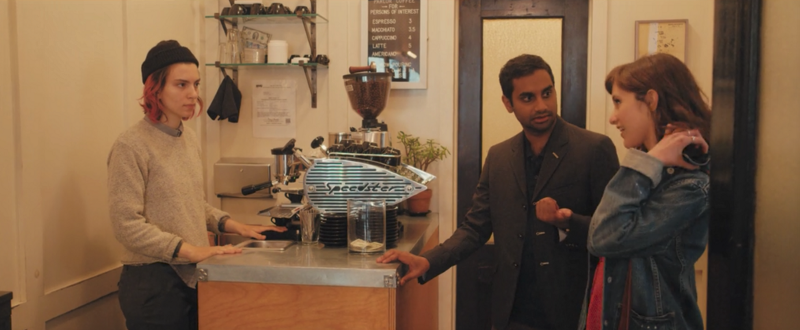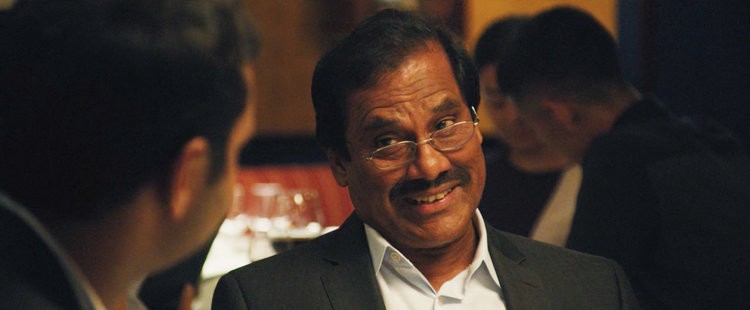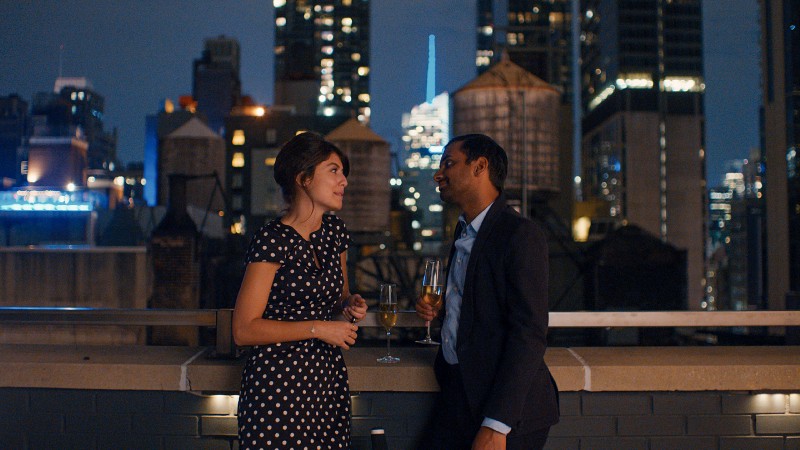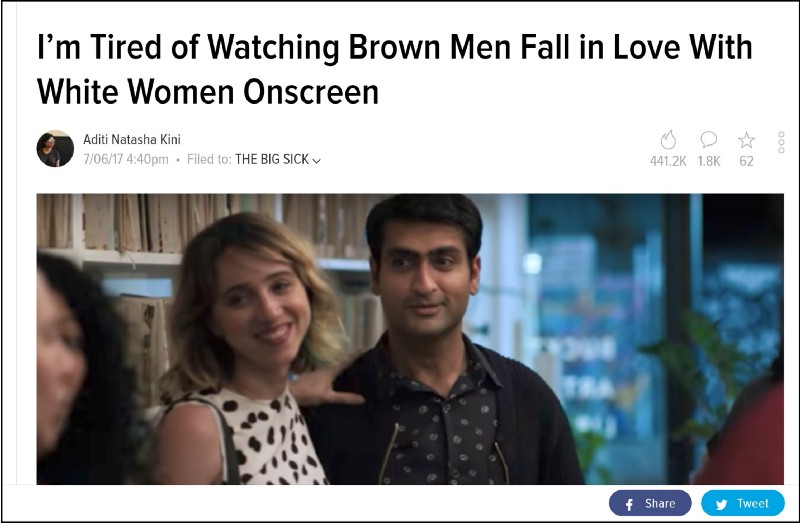On Election Night 2016, probably around 11pm, I looked down at the quiet empty streets from my friend’s apartment balcony in Downtown NYC. Jumping was never on my mind. I just wanted to get as far away from the goddamn TV that was signaling a new incoming reality, one that I hadn’t prepared for. Not in a million years. I thought of older generations whose life trajectories had been twisted by major events. Villagers pressed into fighting their lord’s battles. We blissful bourgeois had thought such times were permanently behind us, that “Do what you love” was iron law. Yet here we were back again. What lay before us? A war? Economic ruin? A bloody resistance that would martyr us into nameless bones? And what more should I have done to prevent this?
Then another thought: Wow, how fucked is Master of None?
Master of None came into this world in late 2015. Back then, Donald Trump was still the court jester, providing free comedy for dinner party conversations. Liberals were enjoying years of political power and mainstream cultural domination, and they — no, we — believed that the future was unshakably ours. Fitting perfectly in its time, Master of None was the purest expression of the Older Millennial vision of social progress, where non-abrasive awareness and charming individual willpower could bring everyone together under one liberal culture. That’s what happens when you come of age under Obama, whose meteoric success and astounding spectrum of relatability made it easy to imagine post-racialism in the near future.
In Master of None, Dev (Aziz Ansari) and his pleasingly diverse band of friends live in exactly that world. If you’re wittily cognizant of social issues AND know to order a cortado at the buzziest café, you can stake your claim in the ascendant progressive future. Now, the show did a lot to advance media representation and exuded a welcome sense of accessible artsiness. For that, I am grateful. That being said, I’ve always thought that the show was overpraised because it uncritically presented a white-centered foodie/wanderlust/HBO metropolitan culture as the apex of social progress.
Behold “MoN Liberalism”, flatterer of gatekeepers and apparent heir to the cultural throne.
Until a pair of small chubby hands broke its neck.

The main problem with the show is that it treats Dev’s minority status with an adorable weightlessness. Despite ostensibly being an outsider, Dev moves rather effortlessly through a Millennialist utopian New York City, where struggling creatives live in large sun-bathed apartments, go to Dirty French for first Tinder(!) dates, and randomly jet off to Italy to find themselves. As such, Dev’s character reassures the metropolitan cultural gatekeepers (who, by the way, usually don’t look like Dev, Denise, or Brian) of their own moral soundness because they’ve opened their doors to an outsider, even if that outsider has to be as upbeat and polished as Dev. Furthermore, he protects the gatekeepers from revolution because their acceptance of him gives outsiders something to aspire to.
Let’s examine the biggest difficulties in Dev’s life that shape his dramatic arcs: he is an ethnic minority with immigrant parents (Third Culture Kid), and neither his professional nor personal life is going anywhere. All these elements thrown together should make for a deliciously complex stew of conflicts.
But does Dev deal with cultural clash with his parents? Not really. His parents are actually incredibly chill. And not just for Asian parents. For any parents. His father is a doctor who rose out of a Dickensian factory in India, yet he is cool with his eldest son being a semi-employed 30-something actor who spends more time hunting down taco trucks than building his career. His parents are also down with him suddenly dropping everything to go cavort under the Tuscan sun like an older-but-still-sexy white lady who needs to love life again. Even when it comes to their devout Muslim faith, they’re okay with their son breaking customs such as not eating pork, so long as he doesn’t do it in front of them.
The much-lauded “Parents” episode had the beautiful premise of two 2nd generation Asian Americans realizing they knew nothing about their parents and wanting to change that. Immigration inflicts powerful psychic wounds on families. Immigrant parents lose touch with their friends and family, especially back in the days of expensive collect calls. Language and cultural barriers widen generational gaps between parents and their American-born children. Yes, not every Asian American family story has to be maudlin tragedy porn about escaping horrible Asia on a rickety raft powered by the monkey god’s magic lucky coins. But it is a disservice to treat the story so lightly that all a stoic Taiwanese dad has to do is suddenly tell a childhood story about his son. Then the table laughs, a good time is had by all, and decades of misunderstanding are instantly smoothed over, just in time as the Special Episode ends.

Okay, but maybe Dev faces racism? Not really. Sure, there’s the racial email joke incident in “Indians on TV”, but the rest of the discrimination he faces is often in the form of good-natured cluelessness. For instance, he and his girlfriend Rachel bump into an older man at a wedding who remarks that he loves seeing “ethnically mixed” couples. The man’s biggest crime is that he expresses a good liberal ideal in a clumsy way. With MoN Liberalism, racism is mostly a violation of manners. Or heartwarmingly, racism is shown to not exist at all. When Dev fears that Rachel’s grandma is an old racist bat, it actually turns out she’s a hip old jazz girl and they bond over pasta.
All right, perhaps it can be said that the kind of racism that cool young New Yorkers face is going to be more subtle. Then surely, dating would be the kind of final-frontier prejudice that Dev faces? Not really. The show starts with him getting laid on a first date. From then on, his crises of the heart are that he can’t quite fall 100% in love with a gorgeous and charming woman he’s dating (season 1), and that he has fallen in love with a gorgeous and charming woman who’s engaged (season 2). The “First Date” episode touched on the difficult issue of race and dating, but again, deeper exploration of fetishization and devaluation was sidestepped with a little cleverish banter and winky-emoji wokeness. “How many ethnics does one have to date before it becomes a fetish? 3? 4? (Laugh knowingly) Now shall I get the next round?”

So… Does Dev at least have money problems since he’s a struggling actor? Again, not really. He lives in an Instagram-worthy apartment, thanks to yogurt commercial money. That may actually be a plausible reason in the acting world, but still, it’s a NYC sitcom cliché to allow the characters to live a financier’s lifestyle on a freelancer’s schedule. He becomes more successful in season 2 when he effortlessly lands a gig as a host of a cupcake show, after his sojourn to Italy where he was supposed to contemplate his life choices or something. Why did Dev become an actor anyway? It’s unclear since he’s not some cinephile who’s obsessed with his craft. If anything, he should’ve become a pasta chef. But he has odd moments of artistic integrity, such as when he refuses to host the cupcake show for seven more years because I guess he really wants to do Ibsen? He’s essentially a trustafarian type who drifts in and out of creative pursuits because he feels he’s too special to be a dentist, but doesn’t actually have any creative drive.
And therein lies the show’s biggest failing. It presents this almost obscenely privileged and self-satisfied yuppie/hipster (what David Infante called The Yuccie) city lifestyle without a hint of self-criticism (unlike, say, Girls). It’s no coincidence that season 2’s strongest episode, “New York, I Love You”, focuses exclusively on characters whose stories acknowledge the fact that Dev’s NYC wonderland is built on the backs and dignity of so many. It was certainly a welcome change from pasta orgies. Most damning of all, for such a socially progressive show, it never examines if outsiders should even want inclusion into all this in the first place.
Master of None already knows this culture and ideology are unquestionably good and thus, outsiders should totally want in. Furthermore, inclusion should easily happen because despite superficial differences, race and ethnicity are as customizable as your personal style. While at a market in Modena, Arnold even jokes about whether he and Dev should just become Italian, without any awareness of how difficult it is for some to be recognized for just their true cultural identity, much less an adopted one. Like minority kids who grow up wishing they could just be seen as “American” as they feel, only to be denied so often that in the end, their life experiences have indeed made them different from “Americans”.
But hey! Just look at Dev and how he’s just aware enough of his outsider status to spice up your social circle, but not enough to actually get fucking pissed off. Follow his example, and as a reward, you will get through the gates and into secret Father John Misty concerts and date idealized Europeans.
But of course, there aren’t nearly enough spaces for us all.

Recently, there was a backlash from many South Asian female writers against what they saw as an infuriating trend in supposedly progressive works like Master of None, The Big Sick, and Homecoming King. According to the complaints, in all these narratives, the South Asian male protagonist falls for a white woman, and South Asian women are either ignored, ridiculed, or serve as stand-ins for a not-so-desirable ancestral culture.
It was entirely predictable that South Asian women would feel this way. Gender divides in minority communities are the hallmark of a liberalism that is centered on the promise of benevolent whiteness offering slightly more equitable distribution of invites to the big dance than ever before. South Asian women have every reason to be freaked out by the prospect of being left behind by South Asian men, even if it’s only been a movie and a couple of TV shows. The gendered rifts in black communities and Asian American communities, where the men and women accuse each other of selling out to whiteness, are what happens to American minorities under MoN Liberalism. The fundamental flaw in this kind of liberalism is that the ballroom has a maximum occupancy limit. Accepted minorities could simply shred their invitations in solidarity with the rest of their community, but the allure of white acceptance is often too difficult to resist. Those who get their invites are so thrilled that they don’t care who’s been left out, even if it’s their brothers and sisters.
In truth, exclusion has always existed and will continue to exist. But the maddening thing about MoN Liberalism is that it not only excludes you, but then also tells you that your exclusion is a beautiful thing, and that to question it makes you loathsome. This idea of deserved exclusion is imbued in the kind of meritocracy that tells you that the wealthy deserve what they have and to question it makes you a sore loser who never had what it takes. It is one of the major factors inciting political chaos in the West right now.

In one of his leaked emails, John Podesta — the Chairman of the Hillary 2016 campaign — wrote that “an [A]sian” could be one of the minorities for a certain top tier position, and that it’d be “better” if she were a woman. I can’t divine what Podesta truly meant by that, but for many Asian men, it was a reminder of an all-too-familiar kind of exclusion, where the American mainstream wants Asian women — as lovers, friends, as faces and voices of our community — more than us. And we can’t speak out about it because anyone who questions MoN Liberalism must be against social progress. Doesn’t matter if you’re a pro-life gun-owner or a live-and-let-live socialist: you will get called a racist, sexist, or homophobe for speaking up.
This isn’t a diatribe against liberalism as a whole and its ideals of social progress. It should be recognized that liberalism, in striving for a genuinely noble goal, has a higher degree of difficulty than other ideologies that blatantly prey on primitive tribal tendencies. But we also need to be aware of whom liberalism leaves behind, whether economically, socially, or culturally. After the election, much focus has been paid attention to the white working class for being left out. There are others too.
The difficult question now on the Left is whether liberalism has to be renegotiated, or replaced by something else entirely. For Asian Americans, this is an especially pressing issue because the gender divide has long been a festering wound in our community. Since Democratic liberalism was at least less racist than Republican conservatism, we’ve had little choice but to embrace the former. This is particularly true for us who were born in America. But the costs of a forced voiceless choice have been apparent in the internalized racism, the relentless yearning for induction into whiteness, and the reluctance to form anything beyond a sort of trinket culture where our most marketable assets to the dominant majority — like food and girls — are what defines Asian Americana. I’ve seen how vicious online fights can get between Asian men and women, because our community’s anger and resentments have been forced underground beneath a Potemkin village of social progress.

I clearly don’t have the one true answer, but neither does anyone else yet. All I know is that there is an exciting new dialogue happening on the Left after the shambles of 2016, and it is paramount that Asians participate. We must assert ourselves and recognize that we’re neither white nor black, which gives us a unique set of insights and experiences that need to be considered. For Asian men, it is a prime opportunity to finally reject the complacent status quo and strive for something better. We are right to be angry at being emasculated, but we can also learn from the frustrating experience of having been denied certain masculine privileges. From that, we can seek a new masculinity that’s not built upon domination and humiliation. Because we know how shitty that feels, to be on the wrong end of that. And maybe then, the women and the men can start dialogues that ought to have started a long time ago. Unlike many of our parents, we do not have language problems in the world we navigate. Yet we’ve been losing the ability to talk to, and not at, each other. We have to fix that.
And in the fiery renewed debate of race vs. class, we Asians can attest to a lived experience that is, without a doubt, both. Because we know that having an Ivy League degree and a well-paying job do not mean much when you don’t want your children to look like you.
The political stereotype of older Asian Americans was that they were lackeys for conservative white people. Many younger Asian Americans hated that, but then they just became lackeys for liberal white people. We cannot simply be eternal water-carriers, always regurgitating other people’s talking points in one of the worst manifestations of the robotic Asian stereotype.
One of the very infinitesimally small positives of the Trump victory is that it smashed through decades of liberal thought-clutter. Bring a big hammer because there’s plenty of rotting wood to clear. But bring some nails and paper for a blueprint too.

Comments powered by Talkyard.